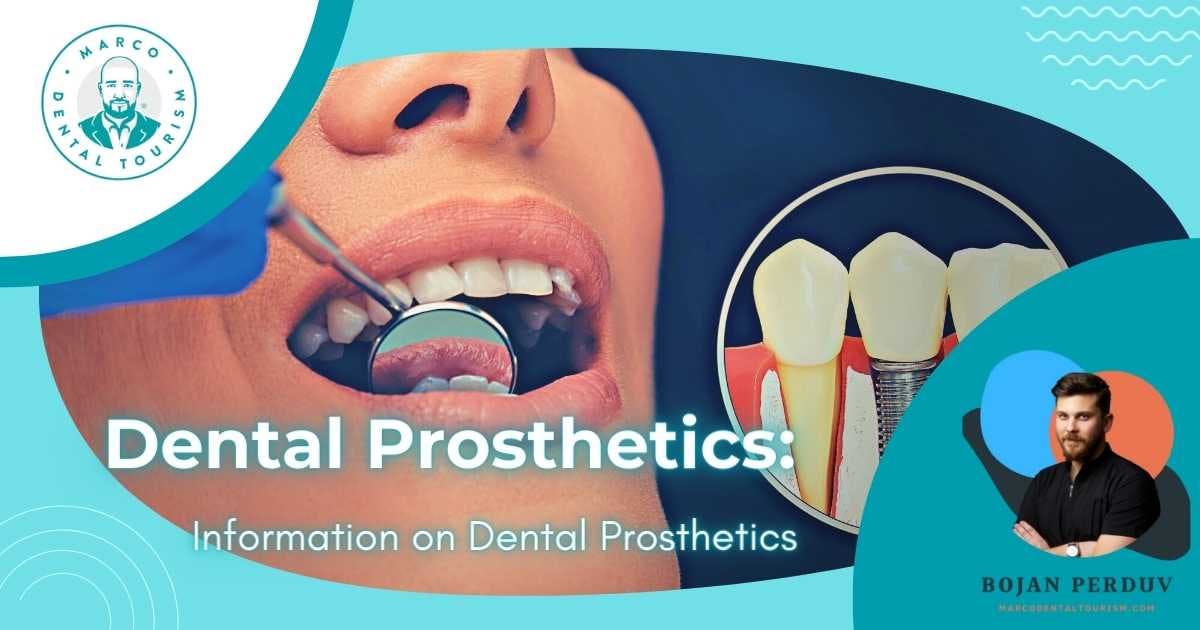
In this blog, we explore the exciting and ever-evolving field of dental prosthetics, which has come a long way since its inception. From ancient times to modern times, dental prosthetics have played a major role in helping people regain the use of their teeth and improve their quality of life. Using a variety of materials, dentists are able to provide patients with dentures that look, feel and function like natural teeth. From custom-made dentures to implant bridges, prosthetic technology is constantly improving, allowing people to enjoy a full set of healthy, natural-looking teeth. We discuss the different types of dentures and how to choose the best option for you.
What are dental prosthetics?

Dental prosthetics is a specialized field of dentistry that deals with the replacement of missing teeth, as well as the restoration of existing teeth. It includes the use of artificial materials such as metal-free crowns, bridges and prostheses to restore or restore the function, appearance and structure of teeth.
When did dental prosthetics first appear?

The history of dental prosthetics is fascinating! Wooden dentures have been used for centuries, and the first known set of wooden artificial teeth was made at the beginning of the 18th century for a Japanese samurai. Wooden prosthetics were replaced by metal prostheses, the alternative of which are foils for correcting all tooth irregularities.
What does dental prosthetics do?

Dental prosthetics is an innovative field in dentistry that helps improve the appearance and functionality of teeth. Prosthetics includes a number of treatments, the most common of which are:
Crowns: Covers for teeth or crowns they are used to restore the shape, size and strength of teeth. It is a custom-made tooth-shaped "cap" that is placed over the tooth to cover it and protect it from possible further damage.
Bridges: A bridge replaces missing teeth with artificial teeth firmly attached to adjacent teeth.
Dentures: Dentures are removable replacements for missing teeth. The progress and development of dentistry contributed to the replacement fixed prostheses discreet and almost invisible, but equally effective foils for straightening teeth.
Implants: Implants are a permanent tooth replacement option that looks and behaves like completely natural teeth.
Fasete za zube-viniri: Veneers for teeth are thin films made of porcelain or other composite material that are cemented to the front surface of the teeth to significantly improve their appearance and quality.
What other dental services fall under prosthetics?

In addition to the usual services such as placing crowns and bridges, dental prosthetics covers and treats others the most common dental problems treatments such as:
Inlays/Onlays: Inlays and onlays are typical treatments for restoring teeth that have mild to moderate tooth decay caries.
Full mouth reconstruction: Full mouth reconstruction is a dental procedure that involves the restoration of all the teeth in the mouth. Dentists can recommend it to patients with severely damaged, decayed or missing teeth, in order to improve the function and aesthetics of the mouth.
Root Canal Therapy: Root canal therapy is a procedure that preserves the natural tooth by removing the infected pulp from the inside. This treatment not only relieves pain, but also helps protect teeth from further diseases. With modern technology, pain is minimal and the procedure comfortable, which ensures a successful outcome.
Gum surgery: Gum surgery is a procedure that repairs and restores gum tissue damaged by periodontal disease. The surgery involves removing diseased tissue and reshaping the gums to create a healthy environment for the teeth and gums. Also, gum surgery can reduce gum recession, improve aesthetics and fully protect teeth.
Orthodontics: Orthodontics is a specialized field of dentistry that focuses on the diagnosis, prevention and correction of improper positions of teeth and jaws using prostheses and other correction aids.crooked teeth.
What does a dental prosthetist do?

A prosthetist specializes in the design, construction and repair of artificial dental appliances such as dentures, bridges and crowns. Dental prosthetists use the latest techniques and materials to create natural-looking dentures that restore the patient's smile and improve overall dental health.
For which problems is a specialist in dental prosthetics necessary?

Prosthodontics can help restore missing or damaged teeth, improve the appearance of your smile, and even correct misaligned bites. A specialist in dental prosthetics is necessary for conditions such as diseases of the mouth and gums, trauma, as well as for replacing teeth with bridges, crowns or dentures.
How to maintain dentures?

In order to preserve the appearance and function of dentures, regardless of whether it is a denture to correct teeth or one that replaces all teeth, they should be carefully cleaned daily with a denture cleaner and a soft-bristled toothbrush. We offer a few more useful tips:
Brush your dentures twice a day with a soft-bristled brush and a mild denture cleaner.
Rinse the denture after every meal.
Soak your denture overnight in a denture cleaner that acts as a disinfectant.
Visit your dentist regularly for an examination and professional cleaning of your teeth, as well as to assess whether the dentures have shown signs of cracking.
Handle the dentures carefully so as not to drop and damage them.
Avoid abrasive toothpastes when cleaning.
Do not use hot water for washing and rinsing.
Keep the denture moist when not in use.
Do not adjust or repair dentures yourself.
Eat soft food if you feel discomfort when chewing harder foods while wearing the prosthesis.
What material are teeth straightening foils made of?

Foils for teeth straightening are made of clear, flexible plastic and are designed to fit comfortably over each tooth to apply gentle pressure and gradually move the teeth into the desired position. They can be easily removed and replaced and do not require special care or maintenance.
Conclusion on dental prosthetics
Dental prosthetics can be a life-changing experience for many, not only in terms of aesthetics but also in terms of quality of life. With modern technologies, the possibilities are unlimited, and the results often exceed expectations. From a single crown to a complete set of dentures, it's amazing to witness how far progress in dentistry reaches. With proper care and attention, dentures can provide years of smiles, confidence and a healthier lifestyle. So, don't wait any longer, take time for your teeth and enjoy the results.














Share your opinion!
What do you think about this topic?
Comments (0)